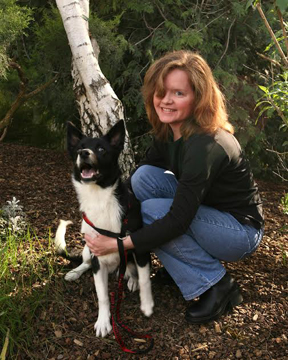Valerie Fioravanti: In your Shorts On Survival piece “Spelunking,” you deliberately shut off your lamp in the black of a lava tube. This feels like the makings of a writing metaphor. Is it?
Danielle Collins: In real life, I did shut off my headlamp to conserve batteries, and I felt the heebie-jeebies of being alone in a dark cave. This unsettling memory became a great building block as I wrote the piece. As an English major, I definitely see the symbolism of extinguishing my own light, and wow, wouldn’t that be an awesome metaphor to play with. . . but in actuality, it was a happy coincidence in my writing.
VF: I thought of it, at least in terms of writing metaphor, as courage to face the darkness. That’s present in the best of writing, no?
DC: Yes, I see what you’re saying. I think it definitely takes courage to face our individual fears lurking in the metaphorical darkness. It’s really challenging to take a step back from these fears and observe ourselves, to talk to ourselves and understand why we feel scared. I also think it takes courage for writers to put ourselves on the page, and then share that with the public. Readers are eager to identify with the piece and see themselves reflected back, and the best way this happens is when the writer is able to authentically share.
VF: The setting, especially the line, “I could meld with these curtains of basalt right now,” suggests a connection with the natural world. Is that a theme in your work?
DC: You’re right, I do incorporate a lot of the natural world into my work. I write mostly creative nonfiction, and focus on my relationships, and the memories I bring to the page are often set against a backdrop of striking natural beauty. I’ve written about beekeeping in Paraguay, about my grandparents in Appalachia, and about the natural wonders of the Southwest. I love traveling, especially to places off the beaten path, and this comes through in my writing. I also love photographing rural landscapes and forgotten spaces.
VF: Another line that struck me was, “I realize that a part of me wants to be free and alone, to disappear into this darkness — to retract like the lava in these tubes, leaving only a memory.” That desire for freedom speaks to me as a reader. Is this a thread you come back to in your writing?
DC: The desire for freedom is a common thread in my writings about certain romantic relationships. Looking back, I realize that in each of those relationships, we did the best we could – but I am left with this sense of frustration that I was unseen, when really want I want, and what most people probably want, is to feel cherished.
VF: Congratulations on publishing “Spelunking.” What’s next?
DC: My number one project is the writing of Surfacing, my in-progress memoir. Surfacing covers the eight-year period when I shifted from dating artists to becoming an artist myself. I am also finishing a braided essay about the relationship of my grandparents. This piece has evolved through many drafts and is almost fit for public consumption.
Another creative outlet for me is my website, JammieWalker.com. This site gives me space to blog, and to feature my writing and photography.
VF: What other piece in this issue of r.kv.r.y. would you recommend to readers?
DC: I enjoyed so many pieces, it was a rich issue. There is one piece that had such a strong voice, it still resonates with me, and that’s “Just Enough Hope” by Toby Van Bryce. He captures the confusion and longing that someone attending their first Alcoholics Anonymous meeting would likely feel. I appreciated that the narrator felt gratitude, rather than judgment, when he listens to people share at the meeting. Instead of telling himself he has nothing in common with the people in the room, he embraces their stories and finds comfort in their recovery. I was left feeling hopeful the narrator would find his way as well.
Valerie Fioravanti writes fiction, essays, and prose poems. Her linked story collection, Garbage Night at the Opera, won the 2011 G.S. Sharat Chandra Prize for Short Fiction and is forthcoming from BkMk Press in 2012. Her nonfiction has appeared in Eclectica, Silk Road, and Jelly Bucket, and she is working on an episodic memoir of sorts.


